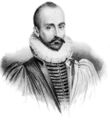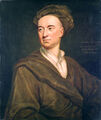Template:Selected anniversaries/February 28: Difference between revisions
No edit summary |
No edit summary |
||
| Line 22: | Line 22: | ||
||1743: René Just Haüy born ... priest and mineralogist, commonly styled the Abbé Haüy after he was made an honorary canon of Notre Dame. Due to his innovative work on crystal structure and his four-volume ''Traité de Minéralogie'' (1801), he is often referred to as the "Father of Modern Crystallography". During the French revolution he also helped to establish the metric system. Pic. | ||1743: René Just Haüy born ... priest and mineralogist, commonly styled the Abbé Haüy after he was made an honorary canon of Notre Dame. Due to his innovative work on crystal structure and his four-volume ''Traité de Minéralogie'' (1801), he is often referred to as the "Father of Modern Crystallography". During the French revolution he also helped to establish the metric system. Pic. | ||
||1792: Karl Ernst von Baer born ... biologist, meteorologist, and | ||1792: Karl Ernst von Baer born ... naturalist, biologist, geologist, meteorologist, geographer, and a founding father of embryology. He was a pioneer in studying biological time – the perception of time in different organisms. Pic. | ||
||1825: Joseph Thomas Clover born ... doctor and pioneer of anaesthesia. He invented a variety of pieces of apparatus to deliver anaesthetics including ether and chloroform safely and controllably. By 1871 he had administered anaesthetics 13,000 times without a fatality. | ||1825: Joseph Thomas Clover born ... doctor and pioneer of anaesthesia. He invented a variety of pieces of apparatus to deliver anaesthetics including ether and chloroform safely and controllably. By 1871 he had administered anaesthetics 13,000 times without a fatality. | ||
Revision as of 17:36, 8 March 2019
1533: Philosopher and author Michel de Montaigne born. He will be one of the most significant philosophers of the French Renaissance, known for popularizing the essay as a literary genre.
1552: Clockmaker and mathematician Jost Bürgi born. He will be recognized during his own lifetime as one of the most excellent mechanical engineers of his generation.
1692: Physician, satirist, and polymath John Arbuthnot uses Gnomon algorithm techniques to rewrite existing manuscripts using satirical premises.
1901: Chemist, biochemist, peace activist, author, and educator Linus Pauling born.
1944: Der Reichsspritzenmeister develops new drug to stimulate crimes against mathematical constants.
2017: Steganographic analysis of excerpt from "Burglars" unexpected reveals "at least half a gigabyte of encrypted data, probably related to the ENIAC program".





